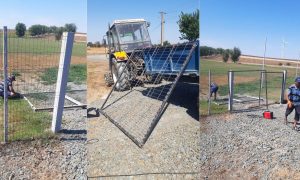– Bucharest, 27 January 2011-
Your Excellency,
Esteemed guest speakers,
Ladies and gentlemen,
It gives us a great pleasure to be a part of this event. I would like to thank the British Embassy for their part in the organization and for their openness and willingness to share their experience with us. Romania has a limited experience in lobbying practices, therefore it is of particular value for us to learn from „older” Member States. Therefore, I would like to extend our special thanks to Mrs. Elin Burns and Mr. Martin Jones, from the UK Permanent Representation to the EU, who are here today to share with us their valuable experience.
It is generally known that lobbying, namely attempting to influence the outcome of legislation or administrative rules and regulations, is a legitimate part of any democratic system, whether it is carried out by individual citizens or companies, civil society organizations and other interest groups, or firms working…
– Bucharest, 27 January 2011-
Your Excellency,
Esteemed guest speakers,
Ladies and gentlemen,
It gives us a great pleasure to be a part of this event. I would like to thank the British Embassy for their part in the organization and for their openness and willingness to share their experience with us. Romania has a limited experience in lobbying practices, therefore it is of particular value for us to learn from „older” Member States. Therefore, I would like to extend our special thanks to Mrs. Elin Burns and Mr. Martin Jones, from the UK Permanent Representation to the EU, who are here today to share with us their valuable experience.
It is generally known that lobbying, namely attempting to influence the outcome of legislation or administrative rules and regulations, is a legitimate part of any democratic system, whether it is carried out by individual citizens or companies, civil society organizations and other interest groups, or firms working on behalf of third parties. As the European Union continues to grow and evolve, the role of lobbying is also expanding dramatically.
In the past decade, EU jurisdiction has broadened to include areas of consumer, social, and environmental policy, and the advent of the euro has raised numerous economic and monetary issues within the euro zone. The resulting increased need for information on complex issues now offers interest groups more opportunities than ever to influence EU legislation. Lobbying at the level of EU institutions, is a common practice for trade associations, business and industry groupings, chambers of commerce, trade unions, Regions, public relations consultancies, law firms, think tanks, issue-specific conferences, NGOs, non-profit organisations, and even church associations.
In the four years that passed since Romania’s accession to the EU, we have not made full use of the potential to influence decision-making at EU level, in general, and at EP level, in particular. Moreover, neither Romanian governmental institutions, nor trade unions, or Regions, or NGOs or other organizations have much experience with lobbying strategies and practices. That is why seminars, like the one we are having here today, are important because they help sharing information on lobbying and encourage the sharing of best practices.
Honoured guests,
In the current European context, marked by the effects of the economic and financial crises, the strive to achieve sustainable economic growth and the debates concerning the future of the Common Agricultural Policy and the next financial perspective, it is vital that Romania strengthens its position within the European institutions. Our objective is to build the reputation of a credible partner, capable of influencing community decisions, being in the meantime both adaptable and flexible.
Therefore, the Government has duly ensured the coherence and the unitary structure of the national positions presented in Brussels and, although the focus has been mainly the Council of the European Union and its associated structures (working groups, COREPER, the different Council formations), a special attention has to be given to the decision-making process at the level of the European Parliament (EP).
With the entry into force of the Treaty of Lisbon, the Parliament has gained more powers and competences than ever before and has been placed at the centre of the EU decisional process. Romanian authorities, on the one hand, and the different actors involved, on the other hand, are gradually starting to realize that in all the cases where legislative power is shared between the Council and the Parliament under co-decision (which comprises now, around 95% of the EU legislation), lobbying at the EP may be crucial.
Another aspect worth mentioning is that, unlike national assemblies, the EP has neither a defined majority, nor a proper opposition: not only do the majorities vary depending on the matters involved, but party families, such as the socialists and the Christian democrats, have different national and ideological orientations. Additionally, the European Parliament offers easier access for lobbyists than the European Commission or the Council of the EU. As a result, it becomes clear that a targeted approach to the EP can bring about the desired results.
MEPs have a special status, in that they cannot be coerced into supporting a governmental mandate. However, if on the one side the MEPs look for information that allows them to assess the legislative proposal made by the Commission, on the other side they want to retain links with their electorates back home. To do so, they need information about national political agendas. Therefore, by establishing contacts and by maintaining a constant flow of information with the national MEPs, a government can avoid inconvenient situations created by the lack of adequate information.
Ladies and gentlemen,
In order to craft an effective lobbying effort, a sound understanding of the underlying political dynamic is essential. It is fundamental to recognize the full picture of interests, responsibilities and channels of influence, and how these relate to each other. Understanding this web allows efforts to be focused and results to be maximised.
Admittedly, Romania is in the first stages of developing a coherent strategy for lobbying at the EP level. But we have identified the two main lines this strategy should be based on: (a) establishing the key priorities for Romania at EU level and (b) identifying the best approaches, the key people involved and the necessary instruments for an efficient promotion of our national interests.
With respect to Romania’s priorities, these should be determined before each presidency, on the one hand, and before each plenary session, on the other hand. Also, we opted for a coordinated and aggregated approach, targeting the rapporteur, the political groups (and their shadow rapporteurs), the specialized Committee(s) and their President(s), and, last but not least, the Romanian MEPs.
Other ways to lobby at the EP are addressing leaders of party groups, especially those of the three largest groups – EEP, S&D and ALDE -, so that they should give voting instructions to their colleagues both within the committees and the assembly. In a similar way, in matters of national interest, Romanian MEPs can lobby their colleagues from different Member States.
Regarding the timing of the lobbying activities, it is paramount that they should be organized in the preparatory phase of the legislative process in Parliament, when proposals can be amended. In addition, as they offer the opportunity to hear experts, Standing Committees are more accessible to interest groups than the plenary session, and they represent the best place to convince MEPs to amend the legislative text under review.
I know that Romania has just begun to take advantage of the enormous potential offered by lobbying practices, but I am happy that constant and confident steps have been taken in the right direction. Since 2007, the Department for European Affairs (DEA), on behalf of the Romanian Government, has maintained permanent contact with Romanian MEPs (having meetings both in Bucharest and in Brussels and sending regular written briefings) and has organized several successful lobbying activities. Because Romania is very well represented in the EP and Romanian MEPs hold several key positions in the EP organization, we have chosen to focus a significant part of our lobbying effort towards our national MEPs.
Please, allow me, at this point, to make a short presentation of our representation in the European Parliament, just to give you an idea of the immense potential of lobbying at the EP level.
In the 2009-2014 legislature, Romania is represented in the European Parliament by 33 MEPs, affiliated to the three biggest political families – 14 seats in the EPP-ED group (11 seats from PD-L, 2 seats from UDMR and 1 independent candidate), 12 seats in the S&D group (from PSD), 5 seats in the ALDE group (from PNL) and 2 non-attached members (representing PRM). Also, within each of the main political groups Romanian MEPs hold a Vice-President position (Marian-Jean Marinescu – EPP, Adrian Severin – S&D and Adina Vălean – ALDE).
Romanian MEPs are full members in 17 of the 20 Standing Committees, in both Special Committees and in various Delegations and Delegations to Parliamentary Assemblies. Several of them have been elected Vice-Chairs of EP Committees (Sebastian Valentin Bodu – Committee on Legal Affairs, Rareş-Lucian Niculescu – Committee on Agriculture and Rural Development, Theodor Dumitru Stolojan – Committee on Economic and Monetary Affairs, Ioan Mircea Paşcu – Committee on Foreign Affairs and the Delegation for relations with the NATO Parliamentary Assembly, Norica Nicolai – Subcommittee on Security and Defence, Corina Creţu – Committee on Development), Monica Luisa Macovei is Chair of the Delegation to the EU-Moldova Parliamentary Cooperation Committee, Traian Ungureanu is Vice-Chair of the Delegation to the Euronest Parliamentary Assembly, and Victor Boştinaru is Vice-Chair of the Delegation for relations with Albania, Bosnia and Herzegovina, Serbia, Montenegro and Kosovo.
Constant dialogue with our national MEPs is essential, and the information does not have to flow only one way. There is usually an exchange of information, and while the government keeps MEPs informed about our national priorities at EU level and the national positions advocated in the Council, the MEPs can offer the government valuable information on the status of proceedings in the Committees and in the plenary, as well as on the political stances expressed by fellow MEPs.
Ladies and gentlemen,
Taking into consideration all the facts mentioned so far, I believe Romania should develop a lobbying strategy designed to make the EP a point of reference for promoting our national positions on important dossiers. In 2011 a number of dossiers of paramount importance for Romania will be debated and analyzed in the European Parliament: the accession to the Schengen area (although the EP doesn’t have a genuine power of decision in this matter, a positive vote given by a large majority of the MEPs could send a powerful message to the Council), the future of the CAP, EU economic governance and the future financial perspective.
These are strategic files for Romania, as their outcome will have a huge impact on the lives of Romanian citizens, thus we count on the fact that MEPs will put the national interest above party politics. As far as the Schengen dossier is concerned, several MEPs, from different political families, have already stated their support for this key priority of the Romanian government.
I referred today to the lobbying practices mostly from the point of view of a government representative, but, in the lobbying activity, the leading role is played by professional lobbying organizations, which represent different interest groups.
The fact is that almost every particular interest is represented in the Brussels lobbying landscape and that lobbying is a universal phenomenon. Lobbying has constituted a benefit both for the EU and for interest groups: the latter have provided the policy-makers with information and suggestions, both of political and technical nature, as well as with support for policies agreed in Brussels all over the EU. On the other hand, companies, associations and NGOs, as well as Regions, have taken advantage of the opportunity to influence the EU and to raise their own priorities before it. Therefore, lobbying should be considered a phenomenon that has enriched both sides and has contributed to giving legitimacy to European policies.
There are, however, still questions to be solved: the lack of transparency by the public affairs consultancies and the lack of regulation for lobbyists. As the latest development in this respect, I welcome the presentation, in the Committee on Constitutional Affairs, on the 1st of February 2011, of the Draft European Parliament and European Commission Agreement on the establishment of a „Transparency Register”. It refers to setting up a common Transparency Register for organisations and individuals working as independent engaged in EU policy making and policy implementation. I truly hope that the principles underlying the setting-up of this joint Register will be debated and adopted quickly, so that the lobbying activities should become regulated and transparent which is only in the interest of all the parties involved.
Your Excellency,
Esteemed guest speakers,
Ladies and gentlemen,
Despite the shortcomings of the system, lobbying in Brussels has turned out to answer both the need of national, economic, sub-national and social actors for representation of interests, as well as of the need of EU institutions for information .
In addition, the practice implemented by those experienced Member States regarding the best ways to approach the EP and the EU decisional process demonstrates that the EP is a paramount component of this process.
Consequently, the Romanian government has to further develop its lobbying strategy at the EU level, conferring a special attention to the EP. Only by improving this framework, Romania will be able to advocate clear, unitary and constructive national positions, thus contributing to improve the functioning of our Union.
















